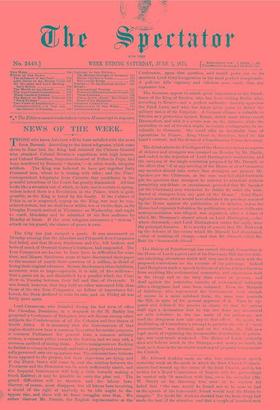The Bishop of Peterborough has carried through Committee in the
House of Lords a good part of his Patronage Bill, but not with- out admitting alterations which will very much do away with the proposed restrictions on the exercise of lay patronage. Indeed Lord Houghton made a speech in favour of giving a larger freedom from anything like ecclesiastical censorship and supervision both to the clergy and to the laity than exists at present, and dead against the restrictive exercise of ecclesiastical authority after a clergyman had once been ordained. Even the Marquis of Salisbury, who represented the Government, took, though of course in a more subdued form, the same tone towards the Bill, in spite of his general approval of it. Thus lie op- posed and defeated the proviso in clause 12 that the patron shall sign a declaration that he has not done any simoniacal act with reference to the use made of his patronage, nor need the clergyman now take any to that effect. So, again, the Archbishop of Canterbury's attempt to prohibit the sale of "next presentations" was defeated, and on the whole, the Bill, as a legal mode of regulating the irresponsible distribution of patron- age, was very much weakened. The house of Lords evidently does not believe much in the Bishops,—not nearly so much, at least, as it does in the inevitable tendency of property to regenerate the Church.


































